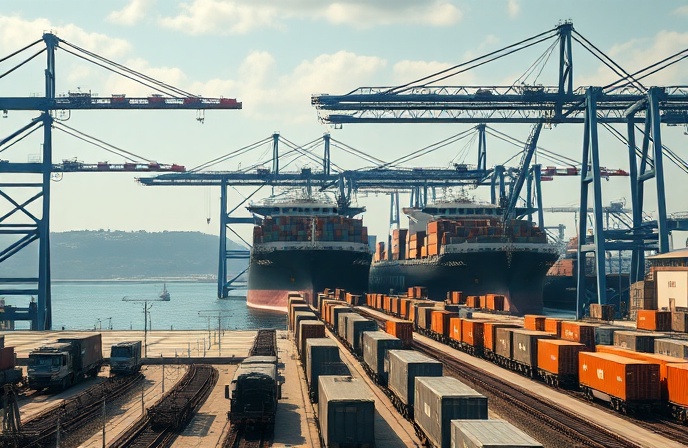Alstom Wins €80M German Rail Contract: Coradia Lint’s Triumph

This article delves into the significant order placed by Landesanstalt Schienenfahrzeuge Baden-Württemberg (SFBW) (the Baden-Württemberg Railway Vehicle Authority) with Alstom, a leading French rolling stock manufacturer, for eighteen Coradia Lint regional trains. This procurement highlights the ongoing modernization and expansion of regional rail networks in Germany, specifically within Baden-Württemberg. The analysis will explore the technical specifications of the Coradia Lint train, its operational capabilities, and the broader implications of this contract for the German railway industry and Alstom’s position within the European rail market. We will examine the strategic significance of this order, including its impact on Alstom’s production capacity, the technological advancements incorporated into the Coradia Lint design, and the broader context of Germany’s investment in sustainable and efficient public transportation. The article further considers the implications of this contract within the larger context of Germany’s railway infrastructure development and the increasing demand for modern, passenger-friendly rolling stock. The swift delivery timeline underscores the efficiency and reliability of Alstom’s manufacturing processes and supply chain.
Alstom’s Coradia Lint: A Proven Technology
The Coradia Lint (Light, Innovative, New Technology) is a diesel multiple-unit (DMU) train renowned for its reliability and efficiency. This specific order underscores the continued success and widespread adoption of the Coradia Lint platform across various European rail networks. The selection of the Coradia Lint by SFBW highlights its suitability for the operational requirements of the Zollernalbbahn network in southern Germany. Key features like its maximum speed of 140 km/h, ample seating capacity (150 seats), dedicated bicycle parking (18 spaces), and passenger amenities such as WLAN, an entertainment and passenger information system, and video surveillance, contribute to its appeal and enhance the passenger experience. The train’s proven track record across more than 30 networks in Europe and Canada further solidifies its reputation for reliability and performance.
Strategic Significance for Alstom
This €80 million contract represents a substantial win for Alstom, showcasing their competitive edge in the European rolling stock market. The order reinforces Alstom’s manufacturing capabilities and its ability to meet demanding delivery schedules. The commitment to delivering the trains within a tight timeframe (less than a year and a half) reflects Alstom’s efficient production processes and robust supply chain management. This project also contributes to the continued employment and economic growth in Alstom’s Salzgitter facility in Lower Saxony, where the trains will be manufactured. The contract builds upon previous successful collaborations between Alstom and German railway operators, further strengthening their relationship and market presence.
Modernization of German Regional Rail
The procurement of these new Coradia Lint trains signifies Germany’s commitment to upgrading its regional rail network. The investment in modern, passenger-friendly rolling stock reflects a broader strategy to enhance the appeal and efficiency of public transportation, encouraging more people to utilize rail travel. Features like increased seating capacity, bicycle parking, and modern passenger amenities contribute to a more comfortable and convenient travel experience. The improved technology also improves operational efficiency and reduces maintenance costs in the long run.
The Broader Context of Rail Infrastructure Investment
This contract is part of a larger trend of investment in rail infrastructure across Germany. The country is actively modernizing its rail network, focusing on improving regional connectivity, enhancing passenger comfort, and promoting sustainable transportation. The investment reflects a strategic commitment to rail as a key component of the nation’s overall transportation strategy, moving towards a more sustainable and environmentally friendly transport system. This is a significant step towards decarbonising the transport sector and contributing to Germany’s environmental goals.
Conclusions
Alstom’s recent contract to supply eighteen Coradia Lint regional trains to Baden-Württemberg represents a significant milestone for both the company and the German railway industry. This €80 million order underscores Alstom’s continued success in the European rail market, showcasing the Coradia Lint’s technological advancements and operational reliability. The contract’s rapid delivery timeframe highlights Alstom’s efficient manufacturing processes and robust supply chain management. Beyond the immediate impact on Alstom and its Salzgitter facility, this procurement signifies Germany’s ongoing commitment to modernizing its regional rail infrastructure. The investment in modern, passenger-friendly rolling stock contributes to a more efficient, comfortable, and sustainable public transportation system. The addition of these trains to the Zollernalbbahn network is expected to enhance regional connectivity and stimulate economic growth. Furthermore, this contract highlights the successful collaboration between Alstom and German railway operators, strengthening their ongoing partnership and demonstrating the positive impact of such public-private partnerships in delivering vital improvements to rail infrastructure. The features of the Coradia Lint, such as its high speed, passenger amenities, and bicycle capacity, directly contribute to a more attractive and appealing rail service for the public. In conclusion, this order showcases a significant step forward in Germany’s commitment to sustainable and efficient public transportation, setting a positive precedent for future rail infrastructure investments across Europe.


